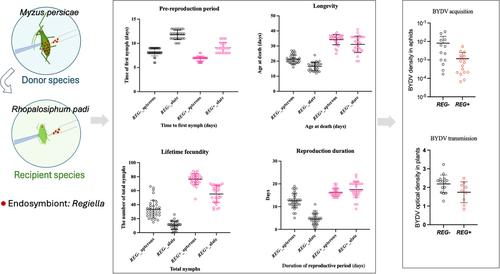当前位置:
X-MOL 学术
›
Pest Manag. Sci.
›
论文详情
Our official English website, www.x-mol.net, welcomes your
feedback! (Note: you will need to create a separate account there.)
A persistent bacterial Regiella transinfection in the bird cherry‐oat aphid Rhopalosiphum padi increasing host fitness and decreasing plant virus transmission
Pest Management Science ( IF 3.8 ) Pub Date : 2025-01-17 , DOI: 10.1002/ps.8642
Wenjuan Yu, Qiong Yang, Alex Gill, Evatt Chirgwin, Xinyue Gu, Chinmayee Joglekar, Paul A. Umina, Ary A. Hoffmann
Pest Management Science ( IF 3.8 ) Pub Date : 2025-01-17 , DOI: 10.1002/ps.8642
Wenjuan Yu, Qiong Yang, Alex Gill, Evatt Chirgwin, Xinyue Gu, Chinmayee Joglekar, Paul A. Umina, Ary A. Hoffmann

|
BACKGROUNDThe bird cherry‐oat aphid, Rhopalosiphum padi , is a major pest of agriculture due to its ability to directly damage crops and transmit plant viruses. As industries move away from chemical pest control, there is interest in exploring new options to suppress the impact of this pest.RESULTSWe describe the production of a transinfected line of R. padi carrying the bacterial endosymbiont, Regiella insecticola , originating from the green peach aphid, Myzus persicae . We show that Regiella increases the fitness of its novel host despite decreasing fitness in its native host. Regiella also shows a low level of horizontal transmission. Importantly the infection suppresses the ability of R. padi to transmit the barley yellow dwarf virus which damages wheat plants.CONCLUSIONOur results suggest this Regiella transinfection could be released to suppress virus transmission by aphids with its ability to persist and spread in situations where damage from the virus exceeds that from direct feeding by the aphid. © 2025 Society of Chemical Industry.
中文翻译:

鸟樱桃-燕麦蚜虫 Rhopalosiphum padi 的持续细菌性 Regiella 转染可增加宿主适应性并减少植物病毒传播
背景鸟类樱桃燕麦蚜虫 Rhopalosiphum padi 是一种主要的农业害虫,因为它能够直接破坏农作物和传播植物病毒。随着各行各业逐渐远离化学害虫防治,人们有兴趣探索新的选择来抑制这种害虫的影响。结果我们描述了携带细菌内共生体 Regiella insecticola 的转感染 R. padi 品系的产生,该菌株源自绿桃蚜虫 Myzus persicae。我们表明,尽管 Regiella 的原生宿主的适应度降低,但其新宿主的适应度有所增加。Regiella 还显示出低水平的水平传播。重要的是,感染抑制了 R. padi 传播大麦黄矮病毒的能力,这种病毒会损害小麦植株。结论我们的结果表明,这种 Regiella 转染可以释放以抑制蚜虫的病毒传播,其能力在病毒造成的损害超过蚜虫直接喂养的情况下持续存在和传播。© 2025 化工学会.
更新日期:2025-01-17
中文翻译:

鸟樱桃-燕麦蚜虫 Rhopalosiphum padi 的持续细菌性 Regiella 转染可增加宿主适应性并减少植物病毒传播
背景鸟类樱桃燕麦蚜虫 Rhopalosiphum padi 是一种主要的农业害虫,因为它能够直接破坏农作物和传播植物病毒。随着各行各业逐渐远离化学害虫防治,人们有兴趣探索新的选择来抑制这种害虫的影响。结果我们描述了携带细菌内共生体 Regiella insecticola 的转感染 R. padi 品系的产生,该菌株源自绿桃蚜虫 Myzus persicae。我们表明,尽管 Regiella 的原生宿主的适应度降低,但其新宿主的适应度有所增加。Regiella 还显示出低水平的水平传播。重要的是,感染抑制了 R. padi 传播大麦黄矮病毒的能力,这种病毒会损害小麦植株。结论我们的结果表明,这种 Regiella 转染可以释放以抑制蚜虫的病毒传播,其能力在病毒造成的损害超过蚜虫直接喂养的情况下持续存在和传播。© 2025 化工学会.































 京公网安备 11010802027423号
京公网安备 11010802027423号